In today's complex financial landscape, understanding the myriad of insurance options and financial planning tools available is crucial for securing your future. From insurance policies that offer living benefits to strategic retirement planning mechanisms like 401K rollovers, making informed decisions can provide peace of mind and financial stability. This comprehensive guide delves into various Insurance with living benefits, critical care types, annuities, retirement strategies, and more to help you navigate your financial journey effectively.
Insurance with Living Benefits and Critical Care
What Are Living Benefits?
Living benefits are provisions in life insurance policies that allow policyholders to access a portion of the death benefit while still alive. These benefits can be pivotal in managing unexpected health issues or financial hardships. Key living benefits include:
- Critical Illness Coverage: Provides a lump-sum payment upon diagnosis of a critical illness such as cancer, heart disease, or stroke.
- Chronic Illness Coverage: Offers funds if you become chronically ill and unable to perform daily activities.
- Long-Term Care Benefits: Assists with expenses related to long-term care services, whether in-home or in a facility.
Critical Care Insurance
Critical care insurance specifically focuses on covering the costs associated with severe health conditions that require extensive medical treatment. This type of insurance can help alleviate the financial burden during challenging times by covering expenses such as hospital stays, specialized treatments, and rehabilitation services. By having critical care insurance, individuals ensure that their medical needs are met without depleting their savings or relying solely on government assistance programs.
Annuities, Retirement Planning, and 401K Rollovers
Understanding Annuities
Annuities are financial products designed to provide a steady income stream, typically during retirement. They come in various forms, including:
- Fixed Annuities: Offer guaranteed payments for a specified period or for life.
- Variable Annuities: Payments vary based on the performance of underlying investments.
- Indexed Annuities: Returns are linked to a specific market index, offering a balance between fixed and variable annuities.
Annuities can be an essential component of retirement planning, ensuring a reliable income source to cover living expenses and maintain your desired lifestyle.
Retirement Planning and 401K Rollovers
The Importance of Retirement Planning
Effective retirement planning involves assessing your financial goals, estimating future expenses, and determining the best strategies to achieve a comfortable retirement. Key elements include:
- Savings and Investments: Building a diversified portfolio to grow your retirement funds.
- Income Streams: Identifying various sources of income, such as Social Security, pensions, and annuities.
- Risk Management: Protecting against unforeseen events that could impact your retirement savings.
401K Rollovers
A 401K rollover allows individuals to transfer their retirement savings from a previous employer's 401K plan into an Individual Retirement Account (IRA) or another qualified retirement plan. This process is beneficial for several reasons:
- Consolidation: Simplifies management by combining multiple retirement accounts into one.
- Investment Options: Often provides a broader range of investment choices compared to employer-sponsored plans.
- Tax Advantages: Maintains the tax-deferred status of your retirement funds, avoiding immediate tax liabilities.
Properly managing a 401K rollover can enhance your retirement strategy, ensuring that your savings continue to grow and work towards your long-term financial goals.
Auto Insurance and Commercial Auto Insurance
Auto Insurance
Auto insurance is a fundamental aspect of responsible vehicle ownership, providing financial protection against accidents, theft, and other unforeseen events. Standard auto insurance policies typically include:
- Liability Coverage: Covers bodily injury and property damage to others if you're at fault in an accident.
- Collision Coverage: Pays for damage to your vehicle resulting from a collision with another vehicle or object.
- Comprehensive Coverage: Protects against non-collision-related incidents such as theft, vandalism, or natural disasters.
- Personal Injury Protection (PIP): Covers medical expenses for you and your passengers, regardless of fault.
Commercial Auto Insurance
For businesses that operate vehicles as part of their operations, commercial auto insurance is essential. It provides coverage tailored to the unique risks associated with commercial vehicle use, including:
- Higher Liability Limits: Addresses the increased risk and potential costs related to commercial activities.
- Coverage for Business Use: Ensures that vehicles used for business purposes are adequately protected.
- Additional Protections: May include coverage for hired drivers, cargo, and specialized equipment.
Commercial auto insurance safeguards businesses from financial losses related to vehicle incidents, ensuring smooth and secure operations.
Cash Value Insurance and Term Insurance
Cash Value Insurance
Cash value insurance is a type of permanent life insurance that accumulates cash over time, which policyholders can borrow against or withdraw. Key features include:
- Whole Life Insurance: Provides lifelong coverage with a guaranteed cash value component that grows at a fixed rate.
- Universal Life Insurance: Offers flexible premiums and adjustable death benefits, with cash value growth tied to market performance.
- Variable Life Insurance: Combines life coverage with investment options, allowing cash value to fluctuate based on market performance.
The cash value component can serve as a financial resource for emergencies, educational expenses, or supplementing retirement income.
Term Insurance
Term insurance provides life coverage for a specific period, such as 10, 20, or 30 years. It is typically more affordable than permanent insurance because it does not include a cash value component. Key advantages include:
- Affordability: Lower premiums make it accessible for individuals seeking temporary coverage.
- Simplicity: Straightforward policies without the complexities of cash value accumulation.
- Flexibility: Can be converted to permanent insurance in some cases, providing options as your needs evolve.
Term insurance is ideal for covering financial obligations that diminish over time, such as mortgages, education expenses, or income replacement during working years.
Long Term Care, Terminal, and Critical Illness Insurance
Long Term Care Insurance
Long term care insurance covers the costs associated with extended care services, whether in-home or in a facility. As people live longer, the likelihood of needing long-term care increases, making this insurance a valuable component of comprehensive financial planning. Benefits include:
- Coverage for Daily Activities: Assistance with activities such as bathing, dressing, and eating.
- Professional Care Services: Access to nursing care, physical therapy, and other medical services.
- Flexibility in Care Settings: Options to receive care in various environments, tailored to individual preferences.
Terminal and Critical Illness Insurance
Terminal Illness Insurance provides benefits to individuals diagnosed with a terminal illness, typically within a specified timeframe (e.g., 12 months). These funds can be used to cover medical expenses, hospice care, or other end-of-life needs, easing the financial burden during a challenging period.
Critical Illness Insurance offers a lump-sum payment upon diagnosis of a covered critical illness, such as cancer, heart attack, or stroke. This financial support can be used to:
- Cover Medical Costs: Pay for treatments not covered by traditional insurance.
- Modify Living Arrangements: Make necessary adjustments to home or living conditions.
- Replace Lost Income: Maintain financial stability while focusing on recovery.
Both terminal and critical illness insurance provide essential financial support, ensuring that individuals and their families can navigate health challenges without excessive financial strain.
Navigating the world of insurance and financial planning can be daunting, but understanding the various options available is the first step toward securing a stable and prosperous future. Whether it's leveraging living benefits in your life insurance, planning for retirement with annuities and 401K rollovers, ensuring comprehensive auto coverage, or protecting against long-term care needs, making informed decisions tailored to your unique circumstances is crucial. By integrating these financial tools and insurance products into your overall strategy, you can achieve peace of mind and financial resilience for the years ahead.



